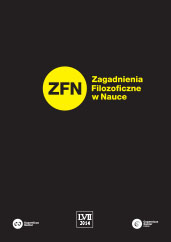Teologia (fides) – nauka (ratio): jaka teologia i jaka nauka?
Theology (fides) – science (ratio): what theology and what science?
Author(s): Andrzej BronkSubject(s): Theology and Religion, Philosophy of Religion, Philosophy of Science
Published by: Copernicus Center Press
Keywords: academic institutions; Christian theology; catholic Church; cognitive immunity; epistemic value; faith; institutionalisation; methodological and institutional status; objectivity; rationality; science
Summary/Abstract: I am interested in the methodological and institutional status of (Christian) theology: what does justify its place in the number of academic disciplines? Is it only the community of inquirers (Ch. Peirce), that conventionally recognizes which type of knowledge and what kind of method is scientific? If so, then what does make the theologicality and scientificality of Christian theology?The theological work is conducted at least in two contexts: in the formation of the doctrine and in the research activity. When a theologian teaches, he does this in the name of the catholic Church which formally equips him with such a mission (venia legendi). It is important to distinguish between an idealized theology as an academic discipline and the multiplicity of different subjects and disciplines actually present in particular theological faculties. Clearly, any answer whether theology is epistéme (scientia) depends on the mean ing of the words theology and science. One can match their senses so that the proposition: „theology is a science” will be analytically true or false. The epistemic and methodological peculiarity of theology manifests itself mostly in the way of justifying propositions (dogma) with premisses derived from the Christian Revelation. Thus in arguing for the presence of theology in the academic curriculum one has to take into account an aporia: the consequence of a strong accent on the methodological autonomy of theology would mean that its theories and propositions could be evaluated only „from inside” by insiders. But this again raises the question of objectivity and intersubjectivity of theological knowledge and of the presence of theology in the communitas scientiarum.
Journal: Zagadnienia Filozoficzne w Nauce
- Issue Year: 2014
- Issue No: 57
- Page Range: 7-32
- Page Count: 26
- Language: Polish

